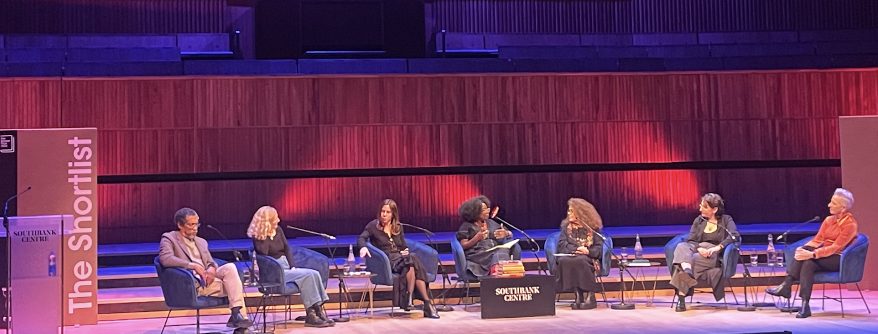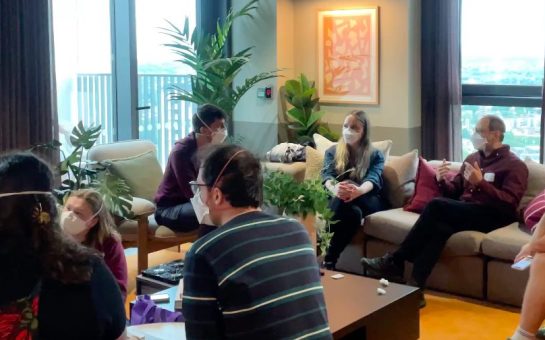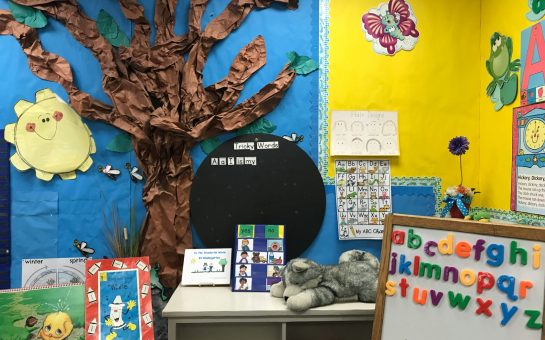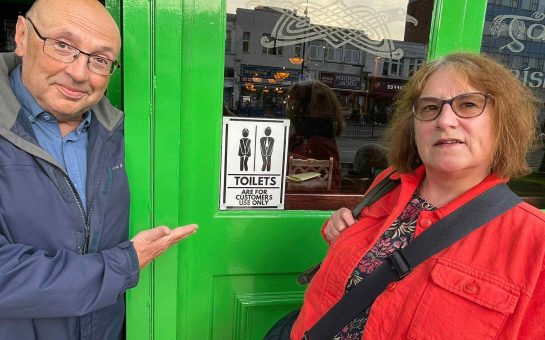The six authors shortlisted for this year’s Booker Prize met in person for the first time to discuss and read from their novels.
Hosted by editor-at-large for Canongate Books and chair of the Caine Prize for African Writing Ellah Wakatama Allfrey OBE, the event took place at London’s Southbank Centre on Monday 11 October, ahead of the winner announcement at Old Billingsgate in London the next day.
The prize, awarded annually for the best-sustained work of fiction written in English and published in the UK and Ireland and chosen by a panel of judges, offers £50,000 and the Booker Prize Trophy.
Head of literature and spoken word at Southbank Centre Ted Hodgkinson said: “Every Booker Prize shortlist is exciting in different ways but I think, as has been widely commented on, this year’s shortlist is a very strong list.”
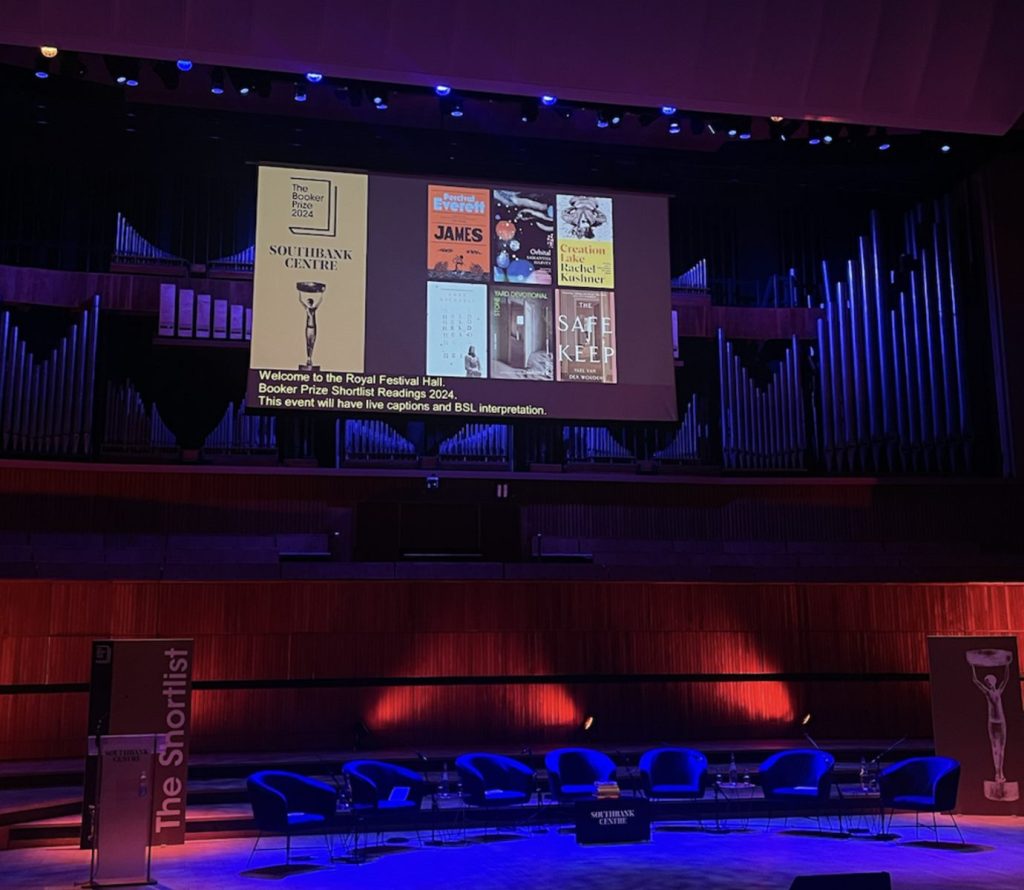
The Booker Prize Shortlist Readings at the SouthBank Centre ready for the authors and host to take their seats beneath a screen with speech-to-text captions
Notably, this year’s final shortlist had the most women writers seen in the prize’s 55-year history, with five out of the six books written by women, including eventual winner Samantha Harvey’s Orbital, Creation Lake by Rachel Kushner, Held by Anne Michaels, The Safekeep by Yael van de Wouden, and Stone Yard Devotional by Charlotte Wood.
Percival Everett was also up for the award for his novel James, a reimagining of Mark Twain’s The Adventures of Huckleberry Finn, told through the perspective of Jim, an enslaved man.
Hodgkinson described the Booker Prize Readings as akin to a rich six-course meal, discussing the impact of hearing the authors provide in-person readings to a live audience.
He said: “It’s a very rich experience and the books are so various and different.
“It’s a real feast.
“You might have listened to it on an audiobook, and there are many ways to encounter literature, but I think hearing an author who has kind of lived with the words created, the cadences of the sentence, and the music of the prose, is a very different thing and it’s something quite unique.
“You hear the author inhabit the world of it and I think that can be quite a rare experience.”
Having chaired the International Booker Prize in 2020, Hodgkinson recalled his own judging experience stating it was an expansive and amazing adventure that united his passions for both fiction and translations.
He said: “In my experience of doing it, there’s a great deal of mutual respect on the panel, bringing lots of different expertise, cultural, backgrounds and perspectives into the mix.
“By the time you’re deciding on the winner, you will have read that book at least twice and it’s a very rigorous and engaged process.”
Commenting on the literary landscape, Hodgkinson further noted how, despite Covid-19 bringing a halt in the world of literary festivals and events, the industry is now broadly seeing a rise in audience attendees.
Although reading can often be a solitary act, Hodgkinson believes events like this are a way to unite individuals through their solitary interests, collectively celebrating the literature they love.
Hodgkinson said: “There’s something very enlivening, galvanizing and hopeful about that in a time that can be quite atomized and solitary.
“I love the experience of an audience meeting an author they love – it’s a very special crackle of excitement that happens and that it’s partly to do with the fact that this is a very exciting shortlist.”
The readings began with host, Wakatama, discussing Everett’s novel James.
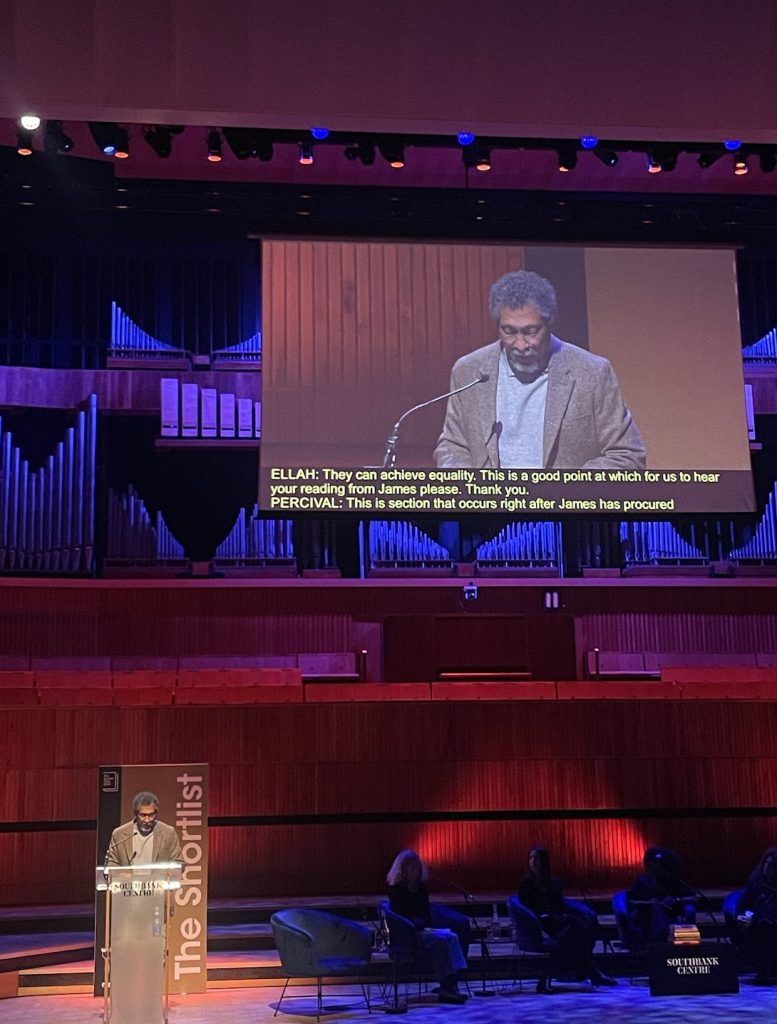
Percival Everett reading from James
Wakatama thanked Everett for his novel where he takes away the diminution of Jim in his retelling of Huckleberry Finn, by using Jim’s full name.
Everett explained he felt it was important to present Jim, with a method to express his agency.
Wakatama then jokingly asked if the American author would be happy if his novel was taught in American schools, nodding to the recent presidential election.
Everett quick-wittily replied he’d be happy if any book was taught in schools, which was met with approving laughter from the audience.
In her discussion with Wakatama, Harvey said that when she first began writing Orbital, which is 136 pages long and explores the complexities of intimacy in the vastness of time and space, her knowledge of space was millimetre-thick.
Samantha Harvey reading from Orbital
Harvey said: “My understanding of space is fairly fleeting.
“I just had to grasp whatever I could grasp and then turn that into art, which is the thing I suppose I do know something about.”
American writer Kushner was next to read from her novel Creation Lake, narrated by a cunning 34-year-old American woman who is sent to France to infiltrate a commune of radical eco-activists led by Bruno Lacomb.
Rachel Kushner reading from Creation Lake
Kushner remarked that following the voice of her protagonist became part and parcel of what made the novel possible.
She said: “It was embodying the voice of this woman who was a kind of devil.
“It is the formal challenges of telling Bruno’s story through her and the ethical challenges of taking on a perspective that is not at all my own.”
Canadian poet and novelist Michaels followed with a reading from Held, which explores the themes of memory, history and grief over four familial generations.
Anne Micheals reading from Held
Micheals said: “There are many ways in which this book tries to understand all of the forces that lead us to a present moment, the ways we choose and the ways beyond our choosing.”
She added that her novel explores the interconnectedness between history and the past, with what brings us to the present, a sentiment which host, Wakatama described as moving.
Van der Wouden was the penultimate author on stage, reading from her debut novel The Safekeep.
Yael van der Wouden reading from The Safekeep
Set in the Netherlands in 1961, The Safekeep follows Isabel, an isolated woman who tends to her family home – a house which Wouden explained exists, having visited it herself.
Wouden said the ideas for her novel were partly drawn from a short story she wrote during a writing workshop on silences around two years ago and rebloomed while she was looking out the window upon vast Dutch fields on a car journey.
Australian writer Charlotte Wood completed the evening’s readings with an excerpt from her novel Stone Yard Devotional.
Charlotte Wood reading from Stone Yard Devotional
Wood explained her natural curiosity in the intersection of religious ideology and atheism, based on her personal experience as an atheist who was raised in a Catholic household, was an inspiring factor in her book.
She went on to express her experiences spun part of the web for her novel, which follows an unnamed atheist narrator, who finds herself staying at a monastery’s guesthouse in her childhood town after her marriage fails.
To conclude the Booker Prize Readings, those in attendance had the opportunity to purchase copies of the shortlisted books and to have them signed by the writers.
Attendee Rukky Brume said: “I love events like this because it’s for fellow book-minded people to gather and enjoy beautiful readings from books they have read and an opportunity to make new discoveries and meet authors they’ve admired.”
Brume further commented on the power of hearing a book read from its source, rather than a reader reading in their own voice at home, adding to the significance and poignance of the Booker Prize Readings.
When asked what being awarded this year’s prize would mean prior to the winner being announced, Harvey said: “I feel overwhelmed, incredibly lucky, privileged and having seen this kind of foreign country across the water for some time and glimpsing it and never quite reaching it and it feels like having got there just to get to the shortlist.”
She added that a new bike would be on the cards were she to win.
Image credits: Nadia Sayed
